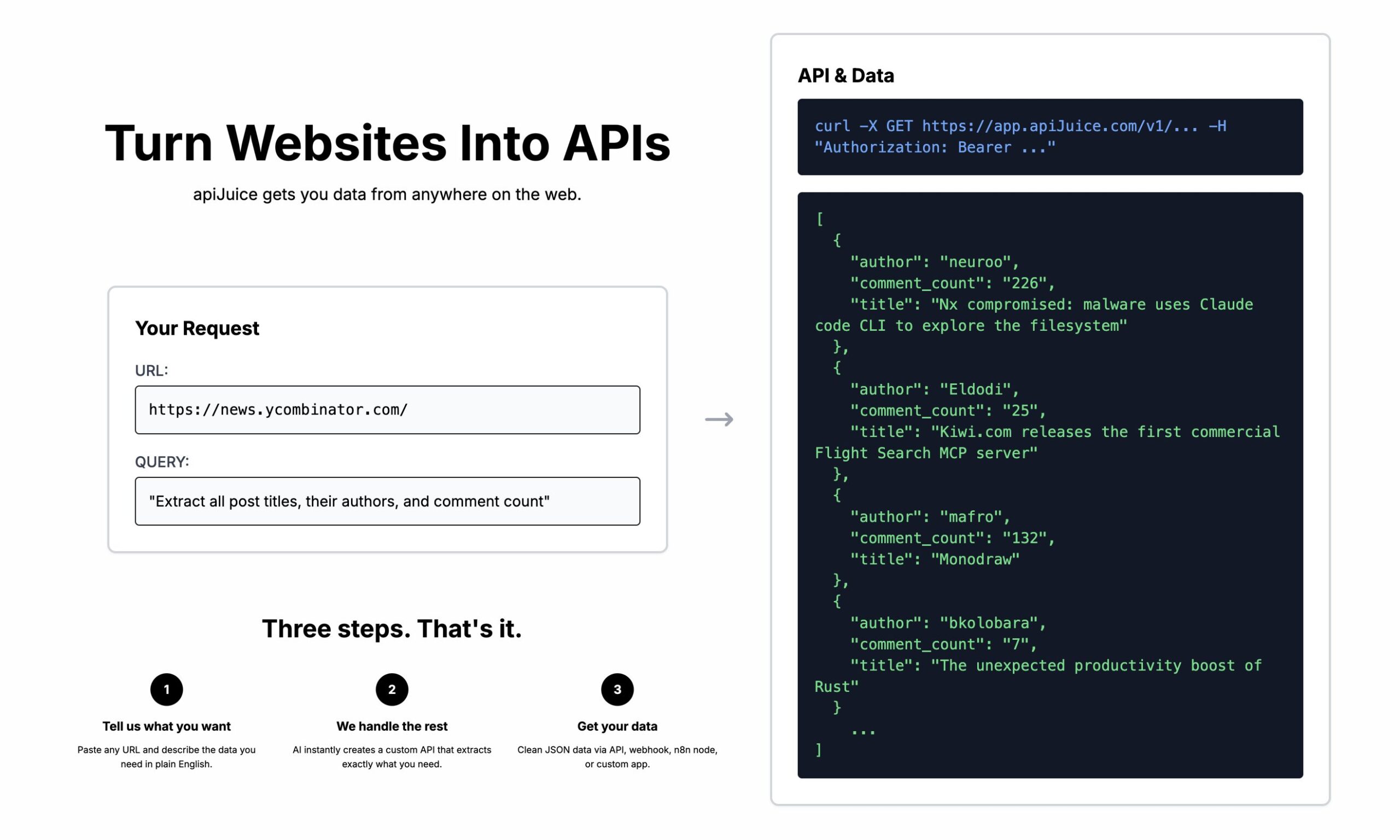Table of Contents
Overview
In today’s data-driven world, accessing and utilizing information from the web often requires technical expertise and complex workflows. apiJuice is an innovative AI-powered data extraction tool designed to simplify web scraping through automation. With apiJuice, users can create custom APIs by providing a URL and describing desired data in plain English. This tool quickly generates API endpoints that extract structured data, delivering clean JSON output for applications, workflows, and custom projects.
Key Features
apiJuice offers several capabilities that streamline data extraction and API creation for users without extensive technical backgrounds.
- URL-to-API Transformation: Convert web pages into structured data sources by generating custom API endpoints efficiently.
- Natural Language Interface: Describe data requirements in plain English without complex selectors or programming knowledge.
- Structured JSON Output: Receive extracted data in standardized JSON format for immediate integration into various systems.
- Multiple Integration Options: Access data through direct API calls, integrate with n8n workflows, or embed into custom applications.
- Performance-Oriented Design: Built to provide responsive data extraction with optimized processing capabilities.
How It Works
apiJuice operates through a streamlined four-step process designed for accessibility and efficiency. Users begin by submitting a target URL to the platform. Next, they describe the required data in natural language, such as “extract product names, prices, and availability status.” The AI system then processes the request and generates a tailored API endpoint specific to the data requirements. Finally, users can retrieve structured data through the newly created API, integrate it as an n8n node, or incorporate it into their applications.
Use Cases
apiJuice serves various data extraction needs across different professional contexts:
- Market Research and Analysis: Extract competitive pricing, product information, and market trends from e-commerce and industry websites for business intelligence.
- Content Aggregation: Collect articles, news updates, and publications from multiple sources for content curation and analysis.
- Lead Generation: Gather contact information and business details from directories and professional platforms for sales and marketing efforts.
- Data Integration Projects: Connect web-based information to CRM systems, analytics platforms, and internal databases for operational efficiency.
Pros \& Cons
Advantages
- Accessibility: No programming skills required for basic data extraction tasks, making it suitable for non-technical users.
- Natural Language Processing: AI interprets plain English descriptions to identify and extract relevant data points.
- Integration Flexibility: Multiple output options including API endpoints, n8n nodes, and custom application integration.
Disadvantages
- Source Dependency: Data quality and availability depend on target website stability and structure consistency.
- AI Interpretation Limitations: Complex or ambiguous data structures may require manual refinement or alternative approaches.
- Performance Variability: Extraction speed and accuracy may vary based on website complexity and anti-scraping measures.
How Does It Compare?
The AI-powered data extraction market in 2025 includes several established players offering similar natural language processing capabilities. Apify provides over 5,000 pre-built scrapers with AI integration and enterprise-scale cloud infrastructure, making it suitable for large-scale operations. Octoparse offers visual workflow creation with AI-enhanced point-and-click functionality, targeting users who prefer graphical interfaces. ScrapingBee features AI-driven web scraping with natural language descriptions, premium proxy networks, and JavaScript rendering capabilities. ScrapeGraphAI operates as both an open-source Python library and premium API service, leveraging large language models for adaptive scraping pipelines.
apiJuice differentiates itself by focusing specifically on rapid API generation from URLs using natural language instructions. While established platforms offer broader feature sets and proven scalability, apiJuice targets users seeking straightforward URL-to-API conversion without extensive setup or technical configuration. The choice between platforms depends on specific requirements including scale, technical complexity, and integration needs.
Final Thoughts
apiJuice presents a focused solution for converting web content into accessible, structured data through API endpoints. Its emphasis on natural language processing and rapid API generation addresses a specific market need for simplified data extraction. While considerations include dependency on source website stability and the evolving competitive landscape, its no-code approach and integration options provide value for users seeking efficient web-to-API conversion capabilities. The platform’s success will likely depend on continued development of its AI interpretation capabilities and expansion of integration partnerships.
